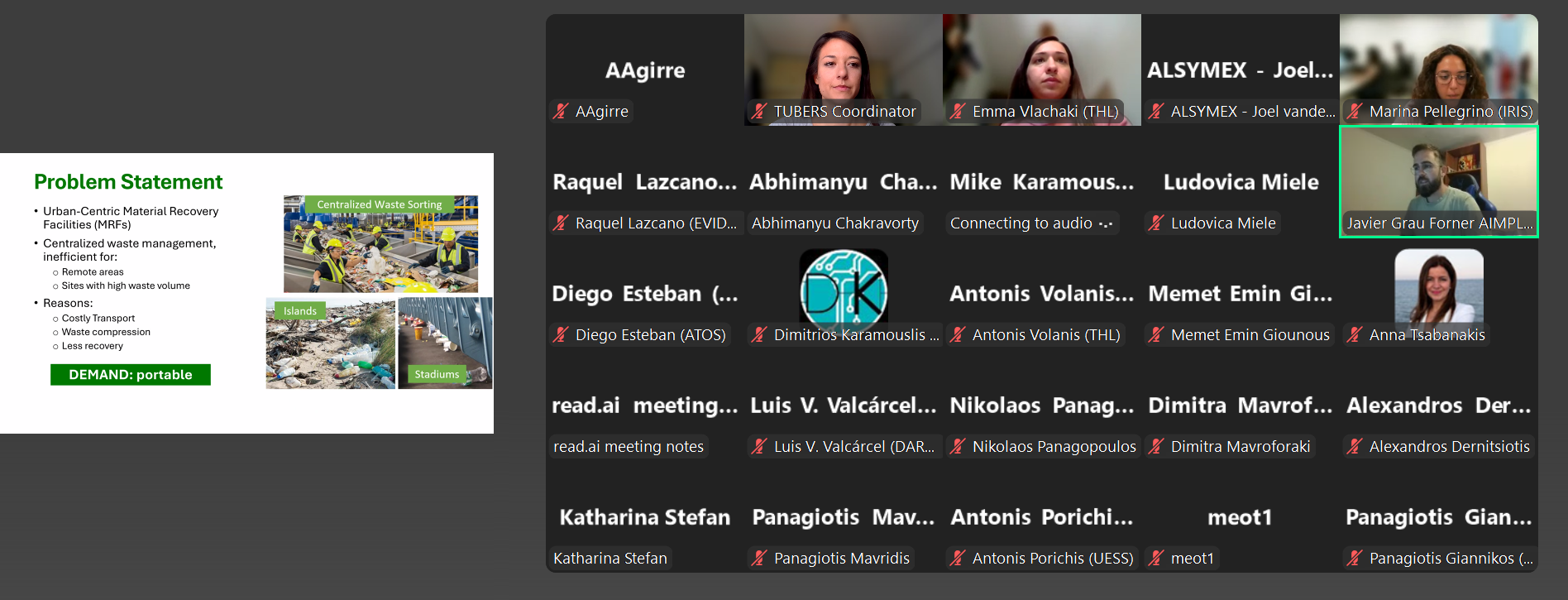The importance of AI, Data, and Robotics for improving the efficiency of critical European infrastructure and industry

On June 18th, the 5th and final part of a series of webinars organised by the React Cluster took place. React stands for Resource Efficiency and Automation for Circular Transformation. It’s a collaboration of projects from the EU Green Deal Cluster: ALCHIMIA, DARROW, TUBERS , RECLAIM ,CLARUS and Wood2Wood projects.
This last episode was titled “The importance of AI, Data, and Robotics for improving the efficiency of critical European infrastructure and industry” and was organised by the TUBERS Project . The webinar featured Joel Vanden Bosch from ALSYMEX, Aitor Agirre from IKERLAN, Marina Pellegrino from IRIS, Dimitris Karamouslis from CERTH, Luis V.Valcárcel from CEIT, Raquel Lazcano from Eviden and was chaired by Eirini Angeli, Project Manager at TECH HIVE LABS.
Joel Vanden Bosch from ALSYMEX opened the session by presenting the TUBERS project’s solution on “The Flow of Innovation: AI, Data and Robotics in Water Infrastructure.” He detailed the ambitious goal of eliminating non- revenue water and leaks in Europe’s extensive drinking water pipe networks. By deploying robotic carriers for in-pipe inspection, monitoring, and repair, TUBERS aims to significantly improve energy efficiency, reduce CO2 emissions, and preserve vital water resources, offering substantial benefits for municipalities and water companies.

Aitor Agirre from IKERLAN, followed with a discussion on “Clarus MLOps: Automating Data and AI Model Sharing in the European Food Industry” for the CLARUS project. He explained how AI technologies are being used to improve the sustainability of food production by reducing energy and water consumption, and optimising logistics. The Clarus MLOps platform, integrated with the IDS (International Data Spaces) cloud data space, supports the entire AI model lifecycle, ensuring secure and trusted data and model sharing between stakeholders.
Next, Javier and Marina from Iris jointly presented on behalf of the RECLAIM project, discussing “Hyperspectral Imaging for Waste and Material Classification: Reclaim’s Portable Material Recovery Facility Application.” They showcased RECLAIM’s portable & robotic Material Recovery Facility (prMRF), designed for decentralised waste sorting near the source. Marina elaborated on their Hyperspectral Imaging (HSI) system, which provides real time waste monitoring and classification for effective pMRF sorting operations.
Dimitris Karamouslis from CERTH then delved into “How DPP improves the data management and interoperability concerning the wood materials ” as part of the WOOD2WOOD project. He introduced the Digital Product Passport (DPP), a tool designed to enhance transparency and sustainability across the entire lifecycle of wood materials. Dimitris explained how the DPP centralises data, improves traceability, supports circular strategies, and integrates with AI tools to optimise processes and ensure compliance with future regulations.
Luis V.Valcárcel from CEIT, presented “Making wastewater treatment more sustainable and efficient using a data-driven AI solution” for the DARROW project. He outlined DARROW’s objectives to optimise resource recovery and improve overall efficiency in wastewater treatment plants through AI systems. Luis emphasised the critical need for reliable, real-time data, and highlighted the importance of human oversight, transparency, explainable AI, and robust cybersecurity in light of new EU regulations classifying wastewater treatment as critical infrastructure.
Finally, Raquel Lazcano from Eviden discussed “Boosting Industrial Efficiency and Collaboration Through Federated Learning” for the ALCHIMIA project. She explained how federated learning is being leveraged to reduce energy consumption and emissions in the EU metallurgy industry. Raquel underscored the benefits of this decentralised AI training approach, particularly in enhancing data privacy, scalability, and compliance.
Key Takeaways:
- Integrated Solutions: AI, data, and robotics are seamlessly enhancing the efficiency and resilience of vital European infrastructures like water and wastewater treatment.
- Data is Foundational: Robust, reliable, and accessible data is crucial for effective AI and data-driven decisions, even amidst challenges like sensor drift.
- Decentralised Automation: Innovations like in-pipe robots and portable recovery facilities highlight a trend towards efficient, localized, and privacy-preserving automated solutions.
- Ethical AI & Compliance: Growing EU AI regulations for critical infrastructure demand human oversight, transparency, explainability, and strong cybersecurity.
- Tangible Sustainability: These technologies are directly contributing to European Green Deal objectives through significant energy savings, CO2 reductions, and resource preservation.
- Scalable & Transferable: The presented solutions are designed for broad applicability, offering frameworks adaptable across diverse industries and sectors.
- Inspiring Impact: This final React Cluster webinar underscored the transformative potential of AI, data, and robotics, showcasing collaborative efforts making a profound impact on European industry and infrastructure.
